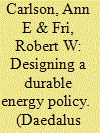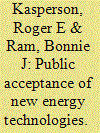| Srl | Item |
| 1 |
ID:
121038


|
|
|
|
|
| Publication |
2013.
|
| Summary/Abstract |
Although the U.S. energy system seems to resist the changes necessary to meet today's challenges related to energy security and climate change, the system has gone through massive change several times since 1850. A major driver in each of these earlier transitions was an economic value, such as mobility, that markets could capture. Because environmental and security values are public goods, changing today's energy system will require a policy that creates a market signal reflecting these values. However, it is also necessary to craft a policy framework that is both durable over a long time period and able to adapt to new information as it becomes available. This essay examines some of the possible attributes of a durable and adaptable policy. The discussion is necessarily preliminary because relatively little formal research exists on this topic. However, even a preliminary examination suggests that considerations of policy durability could affect the choice between a carbon tax and a cap-and-trade system.
|
|
|
|
|
|
|
|
|
|
|
|
|
|
|
|
| 2 |
ID:
121035


|
|
|
|
|
| Publication |
2013.
|
| Summary/Abstract |
In the wake of ominous results about the impending path of climate change, and with gasoline prices hovering around four dollars per gallon, the 2012 presidential and congressional campaigns are full of claims and counterclaims about the transformation of the U.S. energy system. Although much discussion has centered on the need for new energy technologies, this debate as yet has been narrow and limited. Meaningful deployment of any technology will raise questions of public acceptance. Little is known about how diverse publics in the United States will respond to the advent of new energy sources, whether they involve a "second renaissance" for nuclear power, a dash to embrace hydraulic fracking for oil and natural gas, or emerging prospects for renewable energies like wind and solar power. Yet public acceptance will determine the outlook. Adding further complication is the growing debate about traditional energy sources and the extent to which a fossil fuel - based energy system should continue to be central to the American economy. This essay explores the issues involved in public acceptance of stability and change in the U.S. energy system. We conclude with several recommendations for gaining a greater understanding of the public acceptance quandary.
|
|
|
|
|
|
|
|
|
|
|
|
|
|
|
|